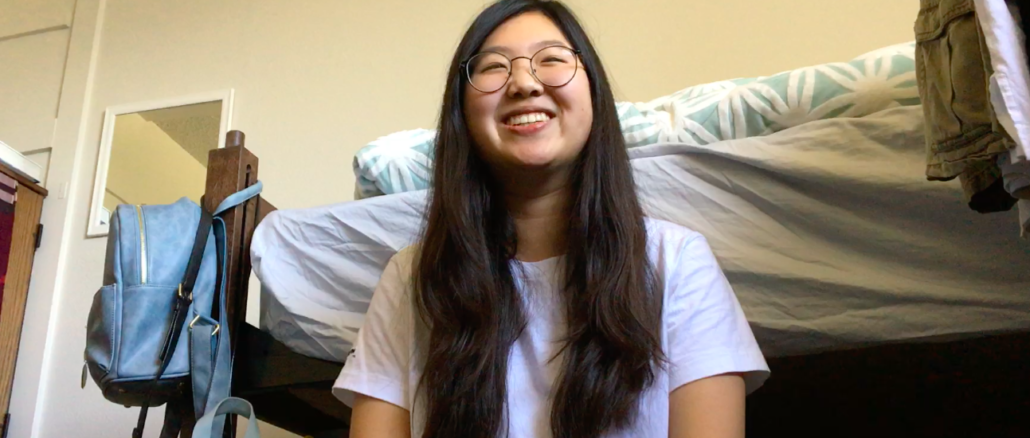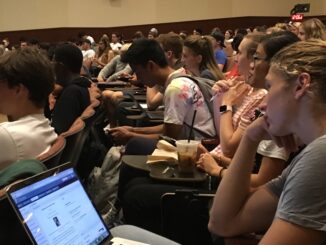
First-year chemistry major Rona Wang is a Chinese student from Guam currently living in a triple with two Asian roommates. Both roommates sought support from the Student Counseling Center and both were hesitant to share their need for counseling with their roommates.
“Both of my roommates experienced this, and it took them a long time to open up to me, because they were, I don’t know, embarrassed,” Wang said. “I can’t say Asians are more introverted but I feel like it’s because of the population balance. The school has less Asians, which makes them a minority.”
While many students might be hesitant to go to counseling because of perceived stigmas around mental health, this is magnified for minority and international students, who face cultural roadblocks as well. Many struggle to assimilate into the dominant culture and when faced with mental health issues they might shy away because of cultural stigmas.
“The Student Counseling Center really doesn’t have a positive and lifting image,” said first-year psychology major Elissa Kim. “It’s kind of like ‘Why do you have to go there? You should be able to handle your own problems.’”
The Pepperdine Student Counseling Center offers free counseling services to all students. A Pepp Post poll of 50 students found that while 68 percent of respondents considered using the Counseling Center, only 40 percent actually visited the center.
Students surveyed shared concerns about visiting the center such as the time commitment, uncertainty about what counseling involves, possible harm to social standing, family disapproval and personal shame, among many other reasons.
Minority students
At this small, private school with roughly 49 percent Caucasians, it is often hard for minorities to find people they connect with.
“Talking to students who have friends at bigger colleges, it’s a little easier for them to find people who can relate to their experiences and maybe find someone who fits their personality,” said Shelle Welty, licensed psychologist and associate director of the Student Counseling Center.
Anh Ngo, junior accounting major and president of the Japanese Student Union, also said that Pepperdine’s demographics make it a little harder for ethnic minorities to connect.
“Pepperdine has more white students compared to other colleges in California like UCLA and USC,” Ngo said. “Sometimes I feel like I am not able to get close to them because of different cultures. I barely see them interested in minority culture.”
The demographics of this school may contribute to feelings of loneliness in minority students, who might already be relatively unwilling to visit the Counseling Center due to language barriers and cultural norms.
“I think for a lot of minority groups, they really want to find someone who understands their experience, so they may be hesitant to come in if they see too many people of the dominant culture,” Welty said.
Cultural norms and stigmas
Asians with a collectivistic culture often have difficulty expressing individual thoughts because their individual needs are secondary to the needs of the whole group, said Charles Choi, a communication professor who specializes in intercultural communication. This may relate to their relatively inactive participation in counseling services, according to research in the International Review of Psychiatry.
“Asians have this unwillingness to put themselves at the center of all conversation,” Choi said. “That influence might prevent someone from being as vocal about their own feelings, because the time and attention placed on one’s own feelings might not be as prevalent as someone who is raised in an individualistic society.”
Psychology Professor Tomaz Martinez said that for many ethnic minorities, a strong sense of family might keep individuals from sharing their problems in counseling.
“When you talk about these problems, normally the stereotype is that you’re talking bad about your family,” Martinez said. “In our cultures, the Latino culture, Asian culture, the collective culture and respect for each other and harmony says that’s not OK.”
Martinez said collectivistic societies also worry about bringing judgement to the family.
“Some cultures think of it as shameful, embarrassing to family, even maybe indicating a weakness of genes,” Martinez said. “If you have some illness, then maybe it’s part of the family and people won’t want to marry your family.”
Echo Xing, a senior business administration major and president of the Chinese Student Association, said cultural stigmas keep Chinese students from counseling even in China, where they are not the minority. People in China do not value psychology the way Americans do.
“Even in China too, I feel like with the counseling centers in different universities, not many people would go,” Xing said. “If I’m the person who goes to the counseling center I probably think that I have some problem, and I kind of don’t want to admit that I have a problem, so it’s hard.”
Of those surveyed, only Asian students reported that their families had a negative view of counseling. Only a few students of all ethnicities reported they would be ashamed to share they went to counseling.
Jeffrey Williams, a staff therapist at the Student Counseling Center, said cultural norms do not have to be insurmountable obstacles.
“Communities of color often think there’s something wrong if you go to a counselor,” Williams said. “However, some students are in so much pain that they at least try, and many end up finding the help they need. They may realize the beliefs in their home and communities might not be as correct as they thought.”
Cultural sensitivity
Pepperdine prides itself on having a culturally diverse student body, so logically more support services that cater to different cultures should be provided, counselors said.
“We need more therapists, more support staff that are culturally sensitive, culturally competent and speak the languages you students do,” Martinez said. “And by doing that they’re likely to use the services, so I think it is up to the university to be more culturally sensitive and develop culturally competent services.”
On a similar note, Williams expressed the need for hiring more cultural minorities as staff members.
“So we’re gonna need more men in the center, more men of color,” he said. “Not saying my colleagues couldn’t help, I think they can, but sometimes for people that access us, they need to see that there’s someone that looks like me there and I have an affinity for them.”
Need to inform students about the Counseling Center
The Pepp Post poll showed than 20 percent of poll respondents do not fully understand the purpose of the Student Counseling Center.
First-year computer science major Timmy Tseng said he rarely sees any information about the Counseling Center on campus.
“The only time I’ve seen the Counseling Center advertise is when a student committed suicide last semester, and they sent an email to the whole student body,” Tseng said. “Besides that I don’t see anything on campus.”
Faculty members also see a need for the Counseling Center to increase their efforts in outreach.
“They have a table at the Caf that you could sometimes walk by but do they really spend the time to get you students to think about mental health issues?” Martinez said. “I think international students are more likely to talk to each other, so I would like the international students to be more alert that if they see an international student struggle, to not be shy to identify that student and get them help someplace.”
Collaboration with student leaders and faculty
Changing the student body’s view on counseling should not be the Student Counseling Center’s sole effort, students and faculty said.
“I’m in the Student Health Advisory Board club, and our goal is to spread more awareness about the mental health and the health of our wellbeing as Pepperdine students,” Kim said. “We do try to work with the Counseling Center a lot, because they feel as if they’re not doing enough to reach to the students.”
The Counseling Center collaborates with outside partners to help students to get a different perspective on counseling services.
“I think there is less and less of a stigma because we have a lot of people who come here, and I think that is credited a lot to student leaders who talk about their own counseling, who really encourage other students to go to counseling,” Welty said.
In addition to student leaders, they also work with faculty and staff to ensure that students are in good hands.
“We also work a lot with faculty and staff to help them be equipped to work with students, to help them know what would be helpful things to do if your student is feeling really panicked or is having a hard time,” Welty said. “We want to do more and more of that, so the whole campus becomes trained in how to help with mental health issues.”
Choi said he tries to normalize the usage of the counseling services in his classes.
“I myself personally have taken advantage of counseling,” Choi said. “There’s still stigma associated but it’s not something I keep from my students. If staff and faculty could be open and honest I think it would be helpful with the situation too.”
Welty believes that this approach works well for minority students who may be especially unwilling to visit the Counseling Center. If faculty members establish a rapport with students, they may be able to ease students into the process.
“This really speaks to how can we help international students and minority students,” Welty said. “We can train the faculty and staff who interact with them to help them be more comfortable talking about it. Eventually, if they wanna come here, that’s great.”
Megan Lao completed the reporting for this story under the supervision of Dr. Christina Littlefield and Dr. Theresa de los Santos in Jour 241 in spring 2018. Dr. Littlefield supervised the web story.




